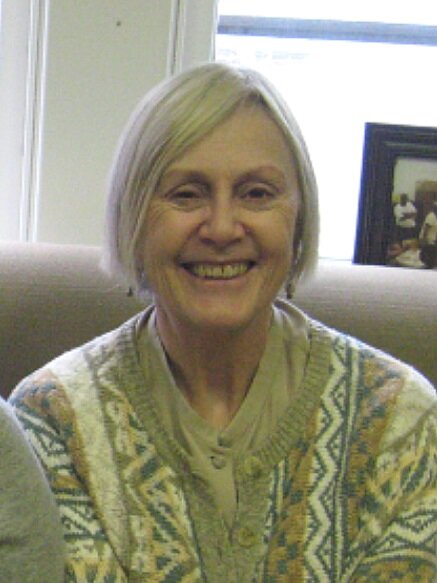Volunteers play a vital role in the success of The Women’s Initiative. In 2018, they donated more than 2,900 hours to promoting our vision that all women in our community have access to effective mental health care. Learn about three of our longest-serving volunteers who have been contributing to TWI since its early days, and whose work strengthens three important services.
PHYLLIS BINDER: Front Desk
After retiring from a career as a psychotherapist, Phyllis Binder sought a way to continue serving the community’s mental health needs. She began volunteering at the newly founded Women’s Initiative, where a handful of therapists were developing ways of providing mental health care and awareness to populations that hadn’t historically had access. More than ten years later, she continues to contribute to what is now a much larger and more diverse organization as a front desk volunteer.
Each Wednesday afternoon, Binder provides a warm welcome to women during our busy Walk-in Wellness Clinic hours. There, she witnesses the positive impact of a woman being able to see a therapist without an appointment when she is in need. She also sees the benefits of women being able to access support groups and mind-body offerings to support their healing—as well as child care for all of the above.
“I enjoy being able to offer a form of support for the delivery of those services by working at the front desk, answering phone inquiries and making a contribution to fulfilling the objectives of TWI in my role as a volunteer,” Binder says.
KATHARINE SCOTT GILLIAM: Mind-Body
The Women’s Initiative’s first location was a house owned by Martha Jefferson Hospital rented to TWI for free. There, Katharine Scott Gilliam began as a volunteer setting up the Living Room in 2009 as a welcoming gathering space for support groups, mind-body offerings and a lending library. She soon began offering Alexander Technique, one-on-one instruction that helps release tension and gain more ease and awareness of one’s own body when doing activities or any other movement.
When TWI moved into its current building and then renovated its lower level to include a large studio space in 2017, Gilliam was among the first to offer trauma-informed yoga classes such as Chair Yoga, which is taught in a slow, mindful manner.
Mind-body offerings allow clients who have experienced traumatic events to transform their ways of being in their bodies. Slow, mindful yoga helps clients build physical health through strength, flexibility and stamina, Gilliam says. Additionally, it supports mental health, including nervous system resilience and brain function. The result is that clients can learn to “tend and befriend” themselves.
SUSAN SCHIFFER: Knitting Circle
Susan Schiffer originally came to TWI as a volunteer to help set up a lending library, after working in the library at Hampden-Sydney College. She was also a knitter, and had an inkling that the craft could help clients of The Women’s Initiative through difficult times by bringing people together and teaching a new skill. That hunch blossomed into the Knitting Circle, which has been offered continuously at The Women’s Initiative since Schiffer started the group more than ten years ago.
The Knitting Circle, a part of our Social Support Program, offers a safe, nurturing place for women to cultivate companionship and creativity. Knitting itself can also be very meditative and calming. Participants range in age from just out of high school to their 80s, creating a nonjudgmental, friendly space.
Schiffer no longer leads the group but still attends as a volunteer teaching clients how to knit. What keeps her connected to The Women’s Initiative? “I feel like everybody involved is doing what they do out of a sense of real purpose,” Schiffer says.
This article was adapted from our Fall 2019 Newsletter.



